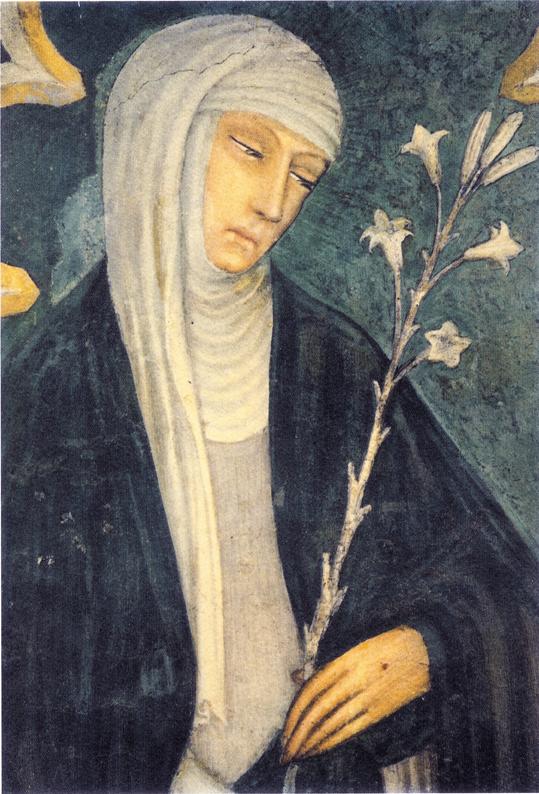 "Be who God meant you to be and you will set the world on fire." So was today's Dominican Saint, Catherine of Siena, quoted by the Anglican Bishop of London at a recent wedding. That the words of an illiterate Italian mystic of the fourteenth century, recorded by amanuenses, should be quoted at the wedding of the future King and Queen of an apparently post-Christian country is remarkable. Still more remarkable, however, is the influence that Catherine had in her own lifetime. Befriending popes and politicians through correspondence from the seclusion of her austere cell and through her adventurous travels, Catherine decisively engaged the political landscape of her day, playing an important role in resolving the Avignon schism. Catherine, then, had surely taken her own advice and discovered the gift and mystery of herself: daring to be a Daniel, speaking the truth to the powerful and mighty on behalf of the poor and marginalised, she was as concerned by the rights of political prisoners as she was by the unity of Christendom, and all this before her early death aged thirty-three.
"Be who God meant you to be and you will set the world on fire." So was today's Dominican Saint, Catherine of Siena, quoted by the Anglican Bishop of London at a recent wedding. That the words of an illiterate Italian mystic of the fourteenth century, recorded by amanuenses, should be quoted at the wedding of the future King and Queen of an apparently post-Christian country is remarkable. Still more remarkable, however, is the influence that Catherine had in her own lifetime. Befriending popes and politicians through correspondence from the seclusion of her austere cell and through her adventurous travels, Catherine decisively engaged the political landscape of her day, playing an important role in resolving the Avignon schism. Catherine, then, had surely taken her own advice and discovered the gift and mystery of herself: daring to be a Daniel, speaking the truth to the powerful and mighty on behalf of the poor and marginalised, she was as concerned by the rights of political prisoners as she was by the unity of Christendom, and all this before her early death aged thirty-three. Without any lack of admiration for this great mystic and theologian of our Order, however, I must confess that I find Catherine's heavily stylised writings very difficult to digest. Some of the images she deploys, particularly to narrate her mystical marriage to Jesus, are, perhaps, not immediately engaging to today's reader of Anglo-Saxon temperament. Nonetheless, there can be no denying that Catherine's admonition to us to 'become who we are' resonates deeply with the spiritual longings of modernity, which seem to be governed by the un-ending quest for self-realisation and self-determination. Some might even see in Catherine a medieval anticipation of Dr. Seuss: "Be who you are and say what you feel, because those who mind don't matter and those who matter don't mind."
Yet, for Catherine, self-realisation is emphatically not a matter of self-determination. If there is a single theme that unites her life and writings, it is that of discernment, the capacity to hear God's call in the individual particularity of daily life. Catherine's teaching on discernment is indebted to the thought of her brother, St Thomas Aquinas (mediated by her spiritual director, Raymond of Capua OP), and yet develops in a way that anticipates the later writings of St. Ignatius of Loyola, founder of the Society of Jesus. In an era when the spiritual vocabulary of many of her contemporaries had shifted to speak primarily in terms of the moral virtue of prudence, Catherine prefers the more old-fashioned category of discrezione, usually translated as 'discernment'. Whilst the English 'discernment' suggests some sort of introspective search for hidden signals from the divine, Catherine's discrezione (perhaps more adequately rendered as 'discretion') is a much more expansive and thoroughly bodily reality: morality and mysticism, thought and action, coinhere in obedience to truth. For Catherine, true discretion, as the pathway to self-realisation, is primarily a matter of obedience to God: we do not realise our own potential by inward discovery, but through reception of the gift and obligation of ourselves in being personally claimed by God.
It was not, then, for simply historical reasons that Pope St. John Paul II named Catherine as a patroness of Europe in 1999. The crisis of European Christianity—perhaps even graver today than the crisis that faced the Church in Catherine's day—demands the type of spiritual reform and radical obedience that characterised Catherine's life and ministry. If Christianity is to be something other than an antiquarian curiosity, or one amongst a smorgasbord of options on the salad bar of postmodern spirituality, then we too—collectively and as individuals—must experience the gift of self-realisation through obedience to Christ. This liberating experience of obedience will be, as St John Paul II put it, "the new experience, the powerful experience, that will generate, through [us], a more just society and a better world."

No comments:
Post a Comment